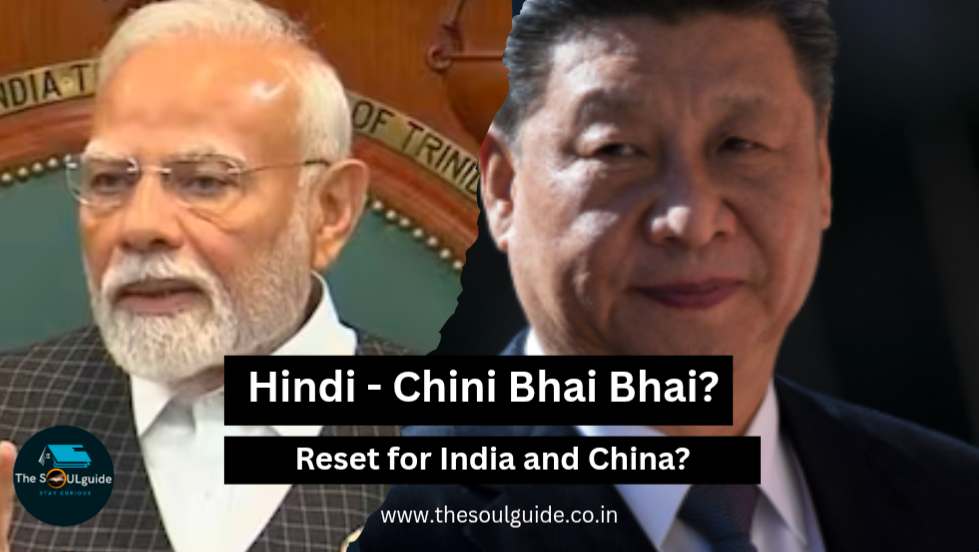Changing Geopolitical and Economic Churn - How India can raise it's global stature?
- TheSoulGuide

- May 18
- 4 min read
In a world marked by rapid geopolitical realignments, economic disruptions, and technological transformations, India finds itself at a strategic inflection point. As global power centers shift and countries reassess alliances and supply chains, India has a unique opportunity to position itself as a leading global power. To do so, it must strategically navigate the current churn and align its domestic strengths with its international ambitions.
Geopolitical Realignment: Strategic Balancing and Leadership- The ongoing geopolitical rivalry between the United States and China, the conflict in Ukraine, the disintegration of global supply chains, and escalating tensions in the Indo-Pacific have presented both challenges and opportunities for India.
India’s historical stance of non-alignment has transitioned into a policy of 'multi-alignment,' enabling it to foster robust relationships with key global powers without allegiance to any single bloc. By collaborating with the U.S. through the Quad, sustaining its partnership with Russia, and enhancing connections with Europe and ASEAN, India can broaden its diplomatic influence while safeguarding its sovereignty over critical national interests.
India’s chairmanship of the G20 in 2023 highlighted its position as a representative for the Global South. Advocating for the issues faced by developing nations—such as climate justice, equitable growth, and access to technology—can enhance India’s soft power and moral standing.
India's domestic economic path will shape its global economic standing. As nations seek to reduce reliance on China, India has the opportunity to emerge as a favored investment hub by advancing in several key areas.
Make in India and Supply Chain Realignment: Global manufacturers are exploring alternatives to China due to geopolitical uncertainties. India can draw these investments by enhancing the business environment, streamlining land and labor regulations, and establishing dedicated manufacturing zones. Initiatives such as the Production-Linked Incentive (PLI) Schemes are already yielding results in sectors like electronics, semiconductors, and pharmaceuticals.
India's digital public infrastructure—comprising UPI, Aadhaar, and CoWIN—serves as a benchmark that numerous countries aspire to emulate. By promoting its digital governance framework and developing a green energy sector (including solar, hydrogen, and electric vehicles), India can take the lead in emerging markets and foster sustainable development.
With one of the largest start-up ecosystems globally, India is well-positioned to become a center for innovation, especially in areas such as AI, fintech, health-tech, and agri-tech. This will bolster its global competitiveness and influence in establishing technological benchmarks.
Enhancing Defense and Strategic Capabilities: In light of escalating regional tensions, particularly along its borders with China and Pakistan, India is compelled to bolster its defense capabilities and strategic stance. This includes a commitment to self-reliance in defense manufacturing through the Atmanirbhar Bharat initiative, which aims to diminish reliance on foreign suppliers and position India as a net exporter of defense technology. Additionally, leveraging its geographical advantages in the Indian Ocean Region, India seeks to strengthen its naval presence and establish naval partnerships to secure critical sea lanes and affirm its role as a net security provider.
Operation Sindoor launched in aftermath of terrorist attack in Pahalgam sponsored by Pakistan, showed the India's capability in new age warfare and it's stance against terrorism, which is eating the world like a termite. The world stood with India when it struck Pakistan at the terror headquarters, in itself reflect the importance of India to the world right now.
The Indian diaspora, recognized as one of the largest and most impactful globally, significantly contributes to enhancing India's international stature. Engaging with this diaspora is essential for economic diplomacy, technology transfer, and global advocacy, as Indian-origin professionals occupy key positions in multinational corporations, governments, and academic institutions. Furthermore, India's rich cultural heritage, encompassing yoga, Ayurveda, cinema, cuisine, and literature, maintains a strong global attraction. Initiatives such as the International Day of Yoga and Indian Cultural Centres can further strengthen cultural diplomacy, fostering goodwill and influence worldwide.
India should assume a pivotal role in the reform of global institutions to align with modern realities. This includes advocating for a permanent seat in the UN Security Council, supported by its economic stature, democratic principles, and responsible international behavior, while also seeking alliances with nations that share similar views to promote a more inclusive global framework. Furthermore, as digital economies and artificial intelligence transform the global landscape, India must actively participate in the establishment of international regulations concerning data privacy, digital commerce, and intellectual property to safeguard its values and interests.
India finds itself at a pivotal juncture in history. The current global upheaval presents a unique opportunity for geopolitical, economic, and technological transformations that can be harnessed for strategic advantage. To capitalize on this moment, India must proceed with clarity, agility, and cohesion—integrating domestic reforms with its foreign policy, investing in human resources, and amplifying its presence in international discussions. By merging its rich civilizational insights with contemporary strategic approaches, India can not only protect its national interests but also influence the global order of the 21st century—emerging as a Vishwaguru (global teacher) in both principle and practice.
Get membership to feature your article. Check here.




Comments